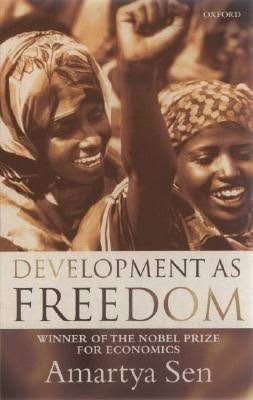Development as Freedom (1999) Sen
Many of Sen's contributions have become common knowledge and do not appear to be as groundbreaking as they once were. Nonetheless, what follows is a selection of thought provoking quotes from Development as Freedom:
On freedom(s):
- "These include (1) political freedoms, (2) economic freedoms, (3) social opportunities, (4) transparency guarantees and (5) protective security. Each of these distinct types of rights and opportunities helps to advance the general capability of a person. They may also serve to complement each other." (p. 10)
- "… the view of freedom that is being taken here involves both processes that allow freedom of action and decisions, and the actual opportunities that people have, given their personal and social circumstances. Unfreedom can arise either through inadequate processes (such as the violation of voting privileges or other political or civil rights) or through inadequate opportunities that some people have for achieving what they minimally would like to achieve (including the absence of such elementary opportunities as the capability to escape premature mortality or preventable morbidity or involuntary starvation). The distinction between the process aspect and the opportunity aspect involves quite a substantial contrast… While this may not be the occasion to go into the complex and subtle issues that relate to this distinction, it is very important to see freedom in a sufficiently broad way." (p, 17)
- "In focusing on freedoms in evaluating development, it is not being suggested that there is some unique and precise "criterion" of development in terms of which the different development experiences can always be compared and ranked. Given the heterogeneity of distinct components of freedom as well as the need to take note of different persons' diverse freedoms, there will often be arguments that go in contrary directions. The motivation underlying the approach of "development as freedom" is not so much to order all states – or all alternative scenarios – into one "complete ordering," but to draw attention to important aspects of the process of development, each of which deserves attention." (p. 33)
On poverty:
- "… in analyzing social justice, there is a strong case for judging individual advantage in terms of the capabilities that a person has, that is, the substantive freedoms he or she enjoys to lead the kind of life he or she has reason to value. In this perspective, poverty must be seen as the deprivation of basic capabilities rather than as merely lowness of incomes, which is the standard criterion of identification of poverty." (p. 87)
On inequality:
- "Inequality has another important role in the development of famines and other severe crises. Indeed, the absence of democracy is in itself an inequality – in the case of political rights and powers. But more than that, famines and other crises thrive on the basis of severe and sometimes suddenly increased inequality. This is illustrated by the fact that famines can occur even without a large – or any – diminution of total food supply, because some groups may suffer an abrupt loss of market power (through, for example, sudden and massive unemployment), with starvation resulting from this new inequality." (p. 187).
On social commitment:
- "As competent human beings, we cannot shirk the task of judging how things are and what needs to be done. As reflective creatures, we have the ability to contemplate the lives of others. Our sense of responsibility need not relate only to the afflictions that our own behavior may have caused (though that can be very important as well), but can also relate more generally to the miseries that we see around us and that lie within our power to help remedy. That responsibility is not, of course, the only consideration that can claim our attention, but to deny the relevance of that general claim would be to miss something central about our social existence. It is not so much a matter of having exact rules about how precisely we ought to behave, as of recognizing the relevance of our shared humanity in making the choices we face." (p. 283)
Featured Posts
Tags
Leadership
Books
Rural Development
Revolution
Climate change
Ethiopia
Politics
Poverty
Power
Ethics
Sustainability
Ideology
Conflict
Civil society
Gender
Development Studies
Colonialism
Agriculture
Human Rights
Globalization
Economics
Governance
Interdisciplinary
decolonization
Culture
Land
Colonization
Capitalism
South Africa
Migration
International development
Post-doc
Education
Inequality
Anthropology
Africa
Institutions
Ethnography
Food Security
Development
Resilience
History
Fellowship
Policy
Islam
Participation
Racism
Middle East
Qatar
Democracy

